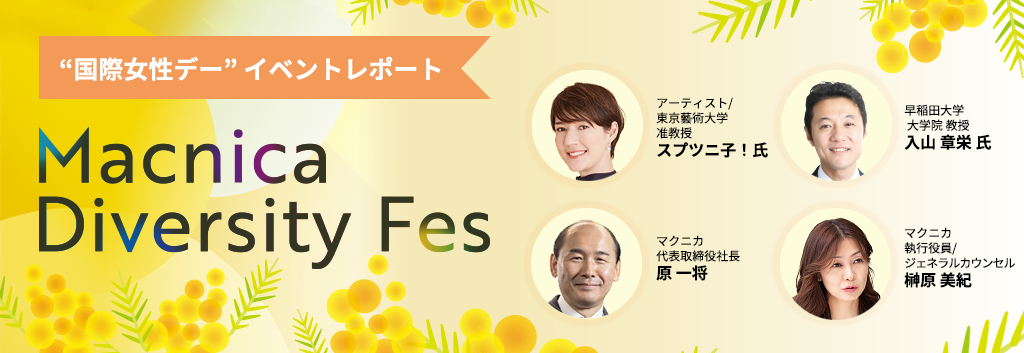
March 8 is International Women's Day, designated by the United Nations as an opportunity to promote women's empowerment and social advancement. Macnica promotes DE&I (Diversity, Equity & Inclusion), but on Friday, March 8, 2024, we held Macnica Diversity Fes, Macnica 's first event for employees, so that each and every employee can rethink "a comfortable working environment regardless of gender." Macnica The event was held in a hybrid of a real venue using the showroom "MET Valley" on the first floor of the head office building and an online venue, with a total of about 440 employees participating. I will tell you about the situation in the report.
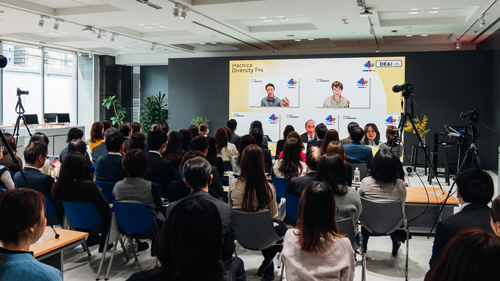
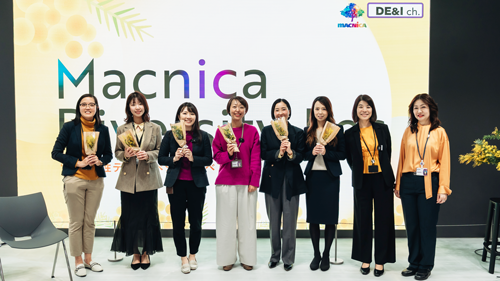
Report Contents
Part 1: Special Discussion "Know Our Macnica's Diversity"
In the first part of the event, we welcomed guests Akira Iriyama, a professor at Waseda University Graduate School who advocates diversity management, and Sputniko!, a world-renowned science media artist, who, together with Macnica 's President Hara and Executive Officer Sakakibara, discussed diversity management and the perspectives necessary for women to play an active role (※).
*On March 8th, a pre-recorded video was available for public viewing at the venue.
Speakers
- Akira Iriyama (Professor, Graduate School, Waseda University)
- Sputniko! (Artist / Associate Professor at Tokyo University of the Arts / Representative Director and President Cradle Inc.)
- Kazumasa Hara (Representative Director and President Macnica)
- Miki Sakakibara (Executive Officer /General Counsel, Macnica)
Summary of the interview
■ Current state of DE&I at Macnica
At the beginning of the interview, Macnica said, "By respecting individuality and diversity, each employee can perform at their best, which also leads to increased corporate value." DE&I The idea of promoting the program was once again shared by Executive Member of the Board Sakakibara, and the issues of harassment and LGBTQ, gender equity training, and other initiatives that Macnica has undertaken DE&I We looked back on our activities.
"We have implemented a variety of awareness-raising and training programs rapidly over the past one or two years, but because Macnica 's culture has always been resilient to change and has a strong desire to grow, I feel that the employees are absorbing the information and gaining a deeper understanding," said Member of the Board Sakakibara.
The Importance of DE&I
Iriyama spoke about "why diversity is being considered important now."
Iriyama: "As a business scholar, I often talk about how diversity is essential for innovation. Innovation is born from the combination of different knowledge. Who has that knowledge? Of course, it's us humans. Having a diverse range of people - men and women, LGBTQ people, foreigners, people with disabilities - naturally brings together a wide range of knowledge, which allows a company to become more innovative and do new things. In the coming age, innovation is inevitable, so in that sense, diversity is an important issue as it is the essence of management."
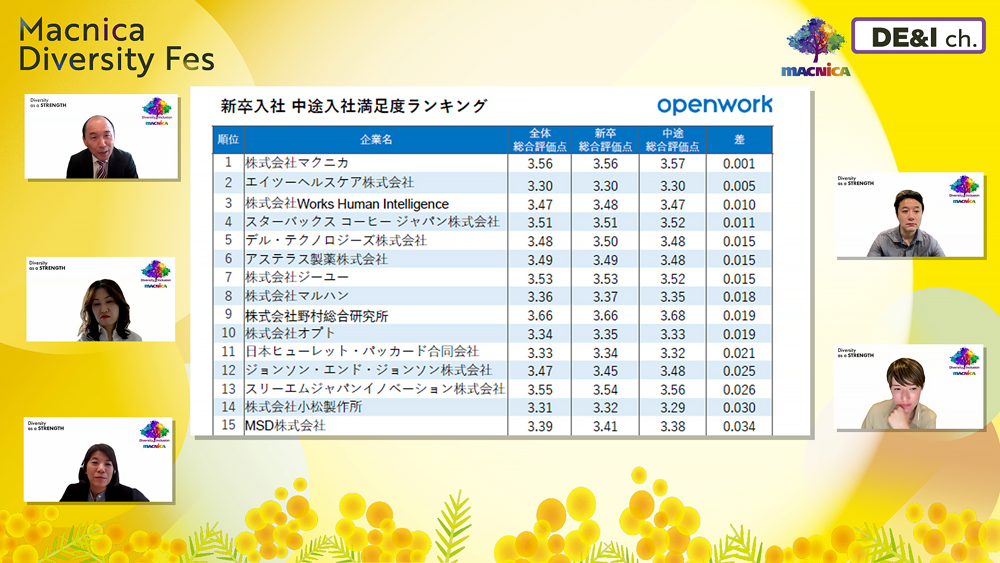
Macnica has historically had a high percentage of mid-career employees and is known for its lack of barriers between mid-career and new graduate employees within the company (see: "New Graduate and Mid-Career Employee Satisfaction Ranking" prepared by OpenWork. Macnica (Reference: "Satisfaction Ranking of New Graduates and Mid-career Hires," prepared by OpenWork, ranked No. 1 in terms of the small difference in satisfaction between new graduates and mid-career hires).President Hara said that the company has a lot of potential for diversity, especially in the area of mid-career employees, as the company hires from a variety of industries, not just those in the same industry.
On the other hand, the Company also points out the real issues of gender bias in job types and the percentage of management positions held by male and female employees. Ms. Sputniko Sputniko, a Japanese woman who works in a science-oriented company, spoke on the issue of women working in science-oriented companies! gave an analysis of the current situation based on data on the percentage of Japanese women entering science-related fields.
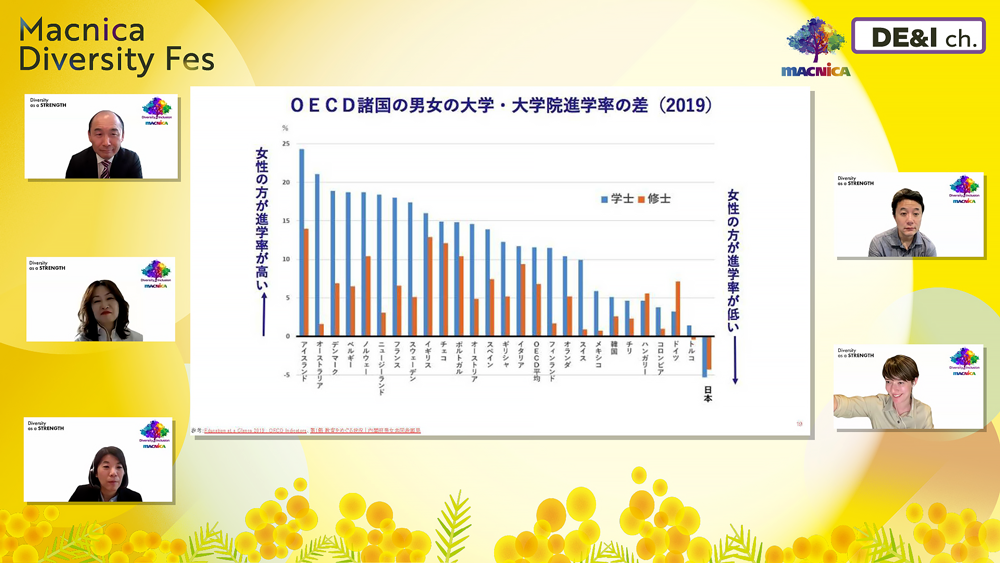
Sputniko!: "In most developed countries, the rate of women going on to university and graduate school is higher than that of men, but in Japan, the rate is still low. The reason for this is that, unfortunately, there is still a bias that women should not be intelligent and that science is not suitable for women. While there are studies that show that the idea of male brains and female brains has no scientific basis, the actual data shows that Japan's university enrollment rate is different from other countries by this much. The difference comes from "society." The power of gender gaps and preconceptions in society cannot be underestimated. Japan is a "science country" that builds its economy on automobiles and technology, so I think that the next big obstacle will be the lack of an increase in the number of women in science."
■ To further advance DE&I at Macnica
In the next part, we asked our two guests about specific things that companies should be aware of in order to promote DE&I.
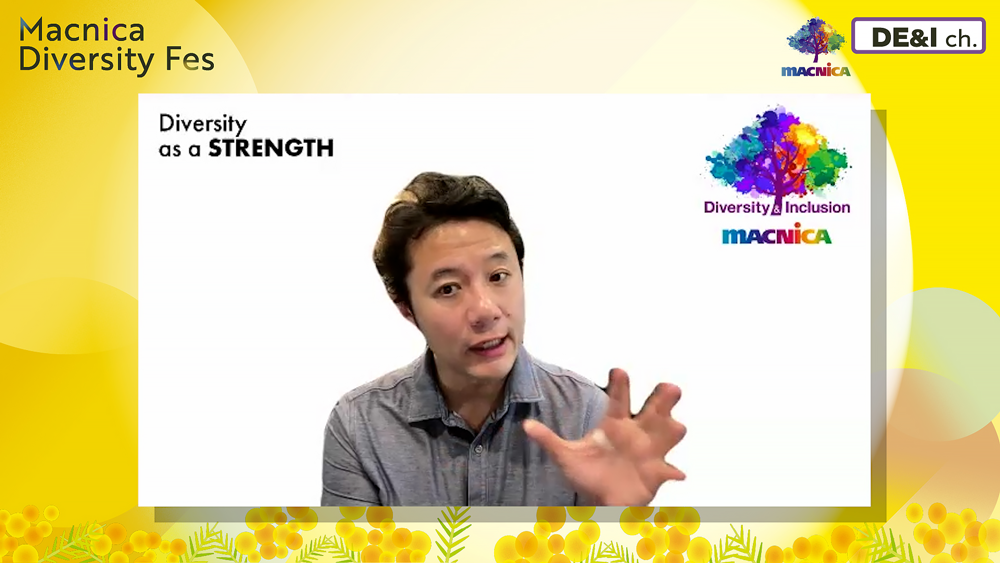
Iriyama: "I think that in Japan, it is the managers who need to change the most. In a highly diverse organization, it is valuable to have a variety of opinions, which is why meetings become contentious. That's why what's important for an organization is not the old-fashioned unanimous-agreed meetings, but facilitation. Managers should not get angry even if an opinion that they disagree with or an unusual one is expressed. They should say, 'I see!' and respond by asking everyone, 'What do you all think about this idea?' The job of managers in the future will be to draw out the opinions of others."
Sputniko! explained the concept of "structural discrimination" using examples from a conference at Tokyo University of the Arts, where she is affiliated. "Structural discrimination" refers to the situation in which disadvantageous situations continue to arise for people with certain attributes, such as gender, race, sexuality, or disability, due to biases in the structure of society and companies as a whole, even if the people involved have no discriminatory intentions at all.

Sputniko!: "Structural discrimination is actually a collection of subtle differences. I was the first female professor at Tokyo University of the Arts, and the faculty meeting, held once every two weeks, was held from 5:00 to 7:00 in the evening. This overlapped with my childcare pick-up time, so it was difficult to adjust the time, and it took me a year to finally ask for a change in the meeting time. After a year, I told them, "Actually...", and they immediately changed the meeting time to 2:00 in the afternoon, saying, "I'm sorry I didn't notice at all, thank you for telling me, we'll adjust it." Based on the experience of the male professors, they simply didn't realize that the meetings overlapped with the childcare pick-up time, and they had no intention of causing me any trouble. It just so happened that I was the one who had noticed it. I think changing the meeting time has made it easier to work, not only for women, but also for future male professors who may join the faculty in the future."
He said that structural discrimination is often something that people do not realize exists unless they are directly involved, so it is important to thoroughly examine whether there are any biases in the structure of working styles in society and companies and to correct them.
In response to Iriyama and Sputniko!'s talk, Executive Member of the Board Sakakibara, who is actually conducting interviews with female employees at Macnica, said, "After all, if you've grown up in this society, it's hard to suddenly break the spell of unconscious bias."

Member of the Board Sakakibara: "Macnica has a culture where people can voice their opinions and get promoted regardless of gender or position, but it seems like women tend to assume that they are supportive, and that in meetings, it's the male superiors who tend to do the talking... I think it's going to be difficult to change that mindset."
Regarding this trend, Sputniko! shared the following data: "Even when looking at it globally, women are less confident than men," and "Men will raise their hands even if they only meet 60% of the skills of the position they are offered, while women will turn it down if they do not meet 100% or more of the skills."
As specific countermeasures, Iriyama-san suggested the following three points: "Supervisors should give accurate feedback and positive evaluations," "Tell them that they can do it," and "Create success stories around them and make them think, 'If that person can do it, I'm sure I can do it too' (vicarious experience)." Macnica also received the opinion that these measures may be at a stage where employees' self-efficacy can be increased.
■Towards the future of Macnica
Finally, President Hara concluded the discussion by looking back on the discussion so far and sharing his thoughts on Macnica 's new personnel system, which will begin in April 2024.

President Hara: "Listening to everyone's talks, I felt that the most important thing is for each and every one of us to keep learning and updating ourselves. We need to understand that biases will always exist, and update our thoughts and sensibilities by listening to the stories of many different people and studying data, otherwise we will not be able to adapt to sudden changes in the environment. I think it is important to repeatedly convey this message through events and other forums like this.
With that in mind, a major point of this new personnel system is how to eliminate structural discrimination and make it open and fair. In order to bring about innovation in a rapidly changing environment, we need to take on the challenge with a diverse formation, and we need to update ourselves. For that reason, we want the new personnel system to be one in which all employees have equal opportunities to take on challenges and provide an environment in which they can build their own careers, so that everyone can take on challenges in an open and fair manner."
Part 2: Panel discussion by female employees
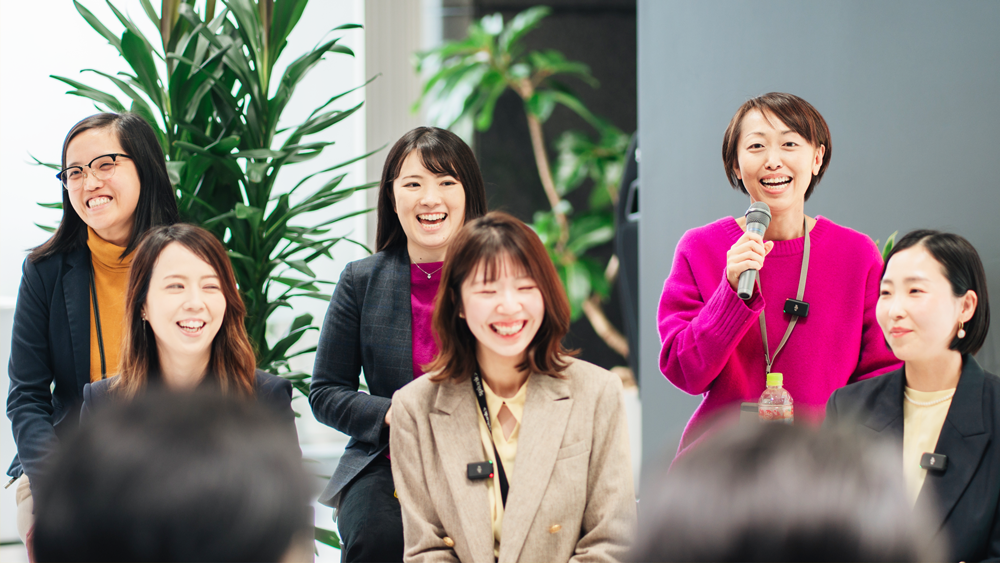
In the second part, six female employees with a variety of careers who are active at Macnica took the stage and, using the video of the discussion in the first part as a reference, delved into topics based on their own experiences in a panel discussion format, such as "What are your work-style concerns and success stories?" and "What kind of company do you want Macnica to be in the future?"
The speakers frankly expressed their worries and anxieties as women change in their life stages, such as "Can I continue my career without giving up?" and "Will it be difficult to return to work after a gap due to childcare leave, etc. at Macnica, which deals with cutting-edge technology?" In response, other speakers, who are all mothers themselves, shared specific examples of departments that have systems in place to back up female employees who return to work, as well as proposing systems that make it easy to work even at changing life stages.
The discussion time flew by, and in a lively atmosphere with many people standing, it ended with the audience asking, "Is it over already?" and "I want to hear more!"
Event Survey Results
A survey was conducted after the event, and 153 people responded.
In both the first and second parts, participants were asked to answer questions such as "Satisfaction with participating in the event (out of 5)" and "Did your opinion change before and after watching the event?"
・No. 1 In the department, satisfaction is 4.37 100% of people who answered that their awareness had changed 79%
・No. 2 In the department, satisfaction is 3.89 100% of people who answered that their awareness had changed 51%
The result was as follows.
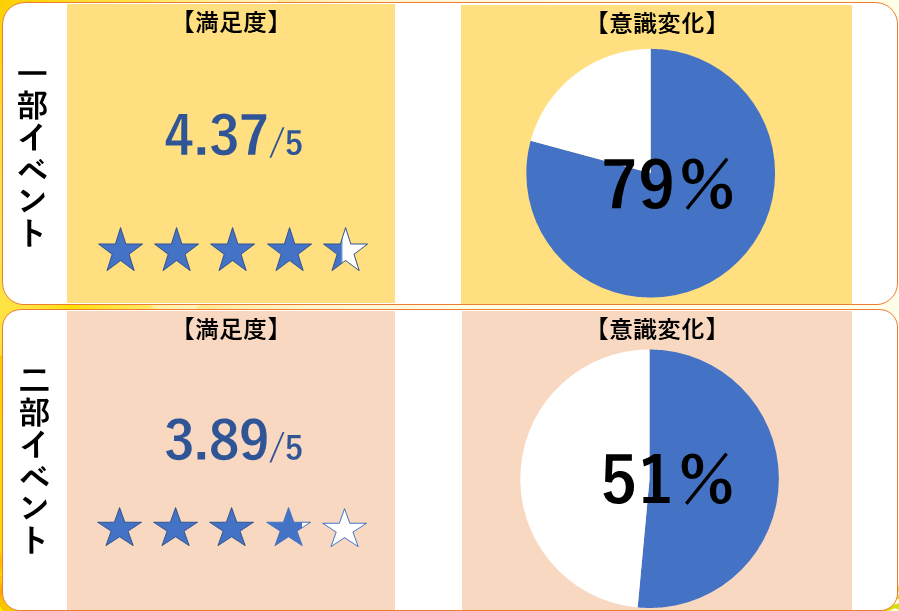
In the free comments for each part,
"If men are willing to raise their hands even with only 60% confidence, then I feel like I should take a bold challenge." "I was inspired by the company's attitude of quickly responding to changes in society." "It was encouraging to know employees in the same situation as me." "I hope that this event will lead to improvements to the system."
We received many positive comments such as the above, and many female employees in particular commented that they felt "encouraged."
Macnica will continue to actively promote DE&I and disseminate information about it.